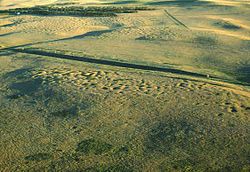Lynch Quarry site
Lynch Quarry site | |
 Aerial view of the site (National Park Service photo) | |
| Nearest city | Dunn Center[2] |
|---|---|
| Area | 690 acres (280 ha) |
| NRHP reference No. | 11000629[1] |
| Significant dates | |
| Added to NRHP | July 13, 2011 |
| Designated NHL | July 13, 2011 |
The Lynch Quarry site, also known as the Lynch Knife River Flint Quarry, and designated by the Smithsonian trinomial 32DU526, is a historic pre-Columbian flint quarry located near Dunn Center, North Dakota, United States.[2] The site was a major source of flint found at archaeological sites across North America, and it has been estimated that the material was mined there from 11,000 B.C. to A.D. 1600. The site was designated a National Historic Landmark in 2011.[3][4][5][6]
Knife River flint was a prized toolmaking material among North America's prehistoric population, as it is particularly easy to work into projectile points, knives, and scraping tools. Materials from Knife River quarries have been found at prehistoric archaeological sites in Northern Canada, New York, and New Mexico, and would have been traded by area tribes for other materials such as shell, obsidian, cloth, and (in the early European contact period) metal weapons.[7] The Lynch site, whose known extent is at least 690 acres (280 ha) has an estimated 20,000 pits from which flint was quarried. The pits range in depth from 3 to 10 feet (0.91 to 3.05 m), and are accompanied by spoil piles. It is located on the banks Spring Creek, a tributary of the Knife River.[8] The site is remarkably well preserved, despite agricultural activity over parts of it, and the digging of shafts for coal mining in some areas. At the time of the site's nomination as a National Historic Landmark, detailed examination of the site for specific work areas had not taken place; the entire site is covered with chipped and flaked stone.[2]
See also
[edit]- List of National Historic Landmarks in North Dakota
- National Register of Historic Places listings in Dunn County, North Dakota
References
[edit]- ^ "Weekly List Of Actions Taken On Properties: 7/18/11 Through 7/22/11" (pdf). Retrieved July 17, 2014.
- ^ a b c "Lynch Quarry Site" (PDF). National Historic Landmark Nomination (redacted 2011 draft). Archived from the original on July 8, 2011. Retrieved August 11, 2013.
{{cite web}}: CS1 maint: unfit URL (link) - ^ "North Dakota's Knife River flint quarry named National Historic Landmark". The Bismarck Tribune. June 6, 2012.
- ^ NPS NHL list for North Dakota
- ^ "More information on Lynch Knife River Flint Quarry NHL". Midwest Archeological Center. August 2, 2011.
- ^ Lauren Donovan (August 2, 2011). "Ancient flint quarries near Dunn Center named national landmark". The Bismarck Tribune.
- ^ "Knife River Indian Villages National Historic Site: Geologic Resources Inventory Report" (PDF). National Park Service. Retrieved November 10, 2015.
- ^ "November 2010 Archeology E-Gram" (PDF). National Park Service. Retrieved November 10, 2015.
- Archaeological sites on the National Register of Historic Places in North Dakota
- Geography of Dunn County, North Dakota
- National Historic Landmarks in North Dakota
- Quarries in the United States
- National Register of Historic Places in Dunn County, North Dakota
- Native American history of North Dakota
- Flint mining
- Pre-statehood history of North Dakota
- Knives


